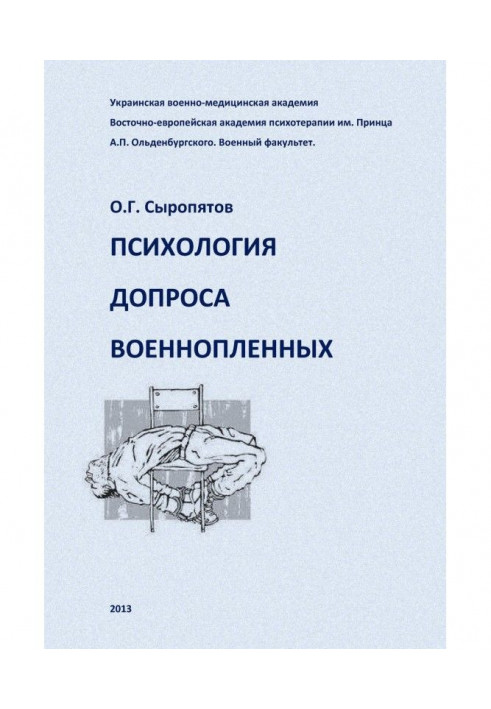Book Psychology of interrogation of prisoners of war
Genevan convention 1949 year forbids the "methods of physical and psychological influence", and in particular any pressure, in an order to obtain information from пленного. At the same time, the analysis of local modern wars testifies that in interrogations the prisoner of war there are psychological refinement, predilection and unjustified cruelty. Results over of stay in the captivity of servicemen brings to expressed to violations of personality, psychical and somatic health. Drawing on accomplishments in the field of diagnostics of unverbal behavior, expounded in a manual, will allow to the military secret service agent within the framework of observance of international norms to conduct the interrogation of prisoner of war and get reliable information. The medical and psychological consequences of stay of servicemen in a captivity and their rehabilitation are presented in a manual. A manual is counted on soldiery дознавателей, psychologists and soldiery doctors.
The book’s text has been translated from the original language using an artificial intelligence system. In most cases, the translation is accurate and clear, but occasionally there may be incorrect phrasing or individual words left untranslated.
- Name of the Author
- Сыропятов Oleg Геннадьевич
- Language
- Ukrainian
- Age
- 18
- Release date
- 2013
Reviews
More books on this topic
Book Дубно 1941. The greatest tank...
190 UAH
171 UAH
Book Secret service agent of the...
69 UAH
63 UAH
Book Aquarium
268 UAH
242 UAH
Book 1941 by the eyes of Germans....
121 UAH
109 UAH
Book An operation is Antarctic...
147 UAH
133 UAH
Book Military diary (2014-2015)
61 UAH
55 UAH
Book Defeat of Bryansk front
190 UAH
171 UAH
Book Operation Bagration. "Both blows...
195 UAH
176 UAH
Book It among stranger. Political...
195 UAH
176 UAH
Book World War II infographic
134 UAH
121 UAH
















09/05/2022
Глибоке дослідження етики та психології допиту
Книга "Психологія допиту військовополонених" є важливим внеском у розуміння етичних та психологічних аспектів допитів у військових умовах. Автор детально аналізує Женевську конвенцію 1949 року та її вплив на практики допиту, підкреслюючи важливість дотримання міжнародних норм. Окремо варто відзначити, що книга не лише описує методи, але й розглядає наслідки перебування військовослужбовців у полоні, що є надзвичайно актуальним у сучасному світі. Використання досягнень у сфері діагностики невербальної поведінки надає читачеві цінні інструменти для проведення етичних і ефективних допитів. Хоча текст перекладено з використанням штучного інтелекту, що іноді призводить до незначних помилок, загальна якість перекладу залишається високою. Ця книга буде корисною не лише військовим дізнавачам і психологам, але й усім, хто цікавиться питаннями етики у військовій практиці.